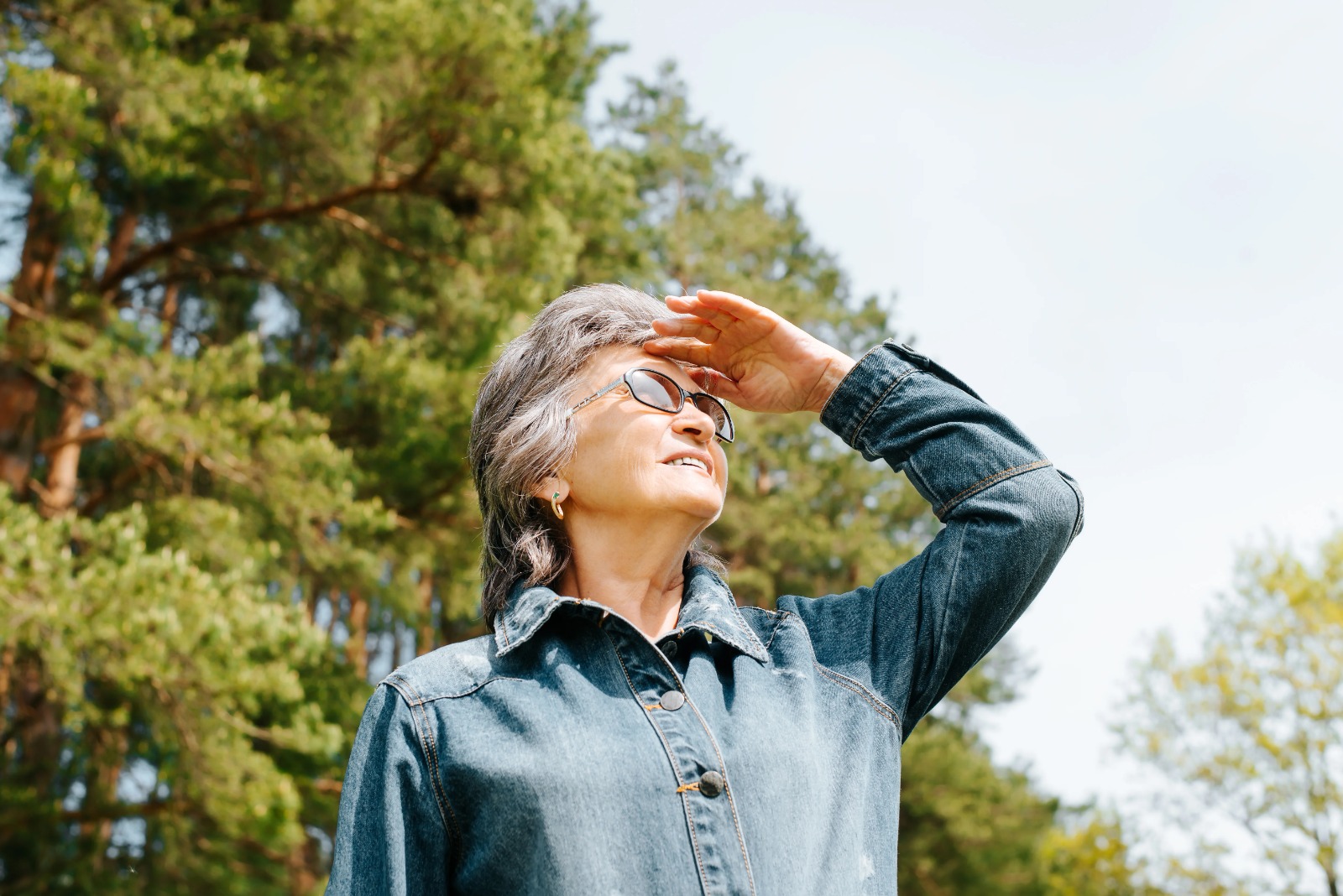
Why Bright Lights Suddenly Bother You After 40 —
And What to Do About It?
“The soul, fortunately, has an interpreter — often an unconscious but still a faithful interpreter — in the eye.” — Charlotte Brontë
Ever wondered why you squint more at your phone screen, flinch when headlights hit you at night, or avoid bright places altogether? If you’ve crossed 40, you’re not imagining it — your eyes are literally changing, and light is feeling a bit too… intense.
Let’s break it down — here’s why bright lights might suddenly start bothering you in midlife, and when it’s worth paying extra attention!
1. Dry Eye Syndrome: The Underestimated Culprit
As we age, our eyes produce fewer tears. This leads to dryness, irritation, and — you guessed it — light sensitivity. Dry eyes can’t shield or moisturize your eyes effectively, so every glare feels sharper than it should.
✅ Tip: Blink consciously during screen time, stay hydrated, and use artificial tears if necessary.
2. Cataracts: Clouding Your Vision (Literally!)
After 40, the natural lens in your eyes begins to cloud — a condition we know as cataracts. Light enters the eye but gets scattered, causing glare and an increased sensitivity to brightness, especially at night.
✅ Watch Out: If oncoming headlights at night are blinding or you’re seeing halos, get a cataract check.
3. Cornea & Retina Changes: Aging’s Gentle Nudge
The cornea may lose smoothness, and the retina’s photoreceptors start to decline. This combo means light isn’t processed as efficiently, leaving you wincing in sunlight or bright rooms.
✅ Did You Know? Eating foods rich in omega-3s and antioxidants may help preserve eye health.
4. Presbyopia & Lens Yellowing: The Slow Lens Shift
Ever noticed the world looking a little yellower? That’s the lens inside your eye aging and yellowing, affecting how light is filtered. Combined with presbyopia (difficulty focusing on close objects), this makes glare sensitivity worse.
✅ A Little Help: Reading glasses, anti-glare lenses, and proper lighting can make a big difference!
5. Pupil Shrinkage: Less Light, Less Adaptation
With age, pupils naturally get smaller. This means your eyes let in less light and struggle to adjust quickly to bright or dim settings. Moving from a dark room to a sunny space? That “ouch” moment is more common after 40.
6. Migraine Sensitivity: Not Just in Your Head
Migraines — which can change character with age — often bring heightened light sensitivity. Even if you weren’t prone to migraines before, midlife shifts might bring them on, making you averse to bright spaces.
✅ Helpful Tip: Identify migraine triggers, stay hydrated, and seek medical support if needed.
7. Medication & Contact Lenses: Unexpected Triggers
Certain antibiotics, antihistamines, and medications can increase light sensitivity. Add contact lenses to the mix and your eyes may feel even more exposed.
✅ Quick Fix: Check side effects of new medications, and ensure your lenses are clean and replaced as per schedule.
8. Eye Inflammation: When Immunity & Hormones Collide
As immunity shifts with age, conditions like uveitis or conjunctivitis become more common, increasing sensitivity to light. Hormonal changes around perimenopause can sometimes play a role here too.
✅ Reminder: Redness, pain, or blurred vision? Don’t ignore them — see an ophthalmologist.
9. Retinal Disorders & Detachment: Rare but Serious
Age increases the risk of retinal issues, including detachment. Sudden sensitivity to light paired with floaters or flashes could signal something urgent.
❗Act Fast: Sudden changes in vision? Head to an eye specialist immediately.
10. Neurological Changes: Brain & Vision Connect
Apart from migraines, other neurological shifts — from mild cognitive changes to past head injuries — can alter how we process light.
✅ Stay Sharp: Managing blood pressure, staying active, and practicing mindfulness can help maintain brain-eye coordination.
💡 When Should You Worry?
Most bright light sensitivity after 40 is normal, linked to aging eyes. But if it’s sudden, severe, or accompanied by pain, floaters, or blurred vision — don’t wait. Schedule an eye check-up.
Your eyes may be changing, but they don’t have to dim your life.
Quick Summary Table:
| Cause | Effect on Light Sensitivity |
|---|---|
| Dry Eye Syndrome | Less lubrication, more irritation |
| Cataracts | Scattered light, glare, halos |
| Cornea & Retina Changes | Reduced light processing |
| Presbyopia & Lens Yellowing | More glare, duller contrast |
| Smaller Pupils | Slower brightness adjustment |
| Migraines | Heightened neural light response |
| Medications/Contact Lenses | Artificial sensitivity |
| Eye Inflammation | Increased swelling, discomfort |
| Retinal Disorders | Light hits damaged areas, discomfort |
| Neurological Conditions | Brain’s altered light processing |
✨ Parting Thought
There’s an old saying — “Age is not lost youth but a new stage of opportunity and strength.” That applies to your eyes too. Bright lights may feel brighter, but it’s just your body asking for a little extra care — a reminder to blink more, hydrate better, and check in with your eye doctor from time to time.
Few expert sources you can trust:
- Cleaveland Clinic: Common Age-Related Eye Problems
- Photophobia Unveiled: London’s Eye Care Experts Explain
- Shedding Light on Photophobia – PMC
- Ojas Eye hospital: What Might Be Causing Light Sensitivity in You
FAQs
After 40, natural changes like smaller pupils, lens clouding (cataracts), and drier eyes make your vision more sensitive to bright lights and glare.
While common in midlife, sudden or severe light sensitivity paired with pain, floaters, or vision changes could indicate retinal issues or inflammation — worth checking with an eye specialist.
Yes, declining estrogen levels can impact tear production, increase dry eyes, and heighten inflammation — all of which contribute to more light sensitivity during and after menopause.
Stay hydrated, wear UV-protective sunglasses, use anti-glare lenses, ensure proper eye hygiene, and get regular check-ups to catch early signs of cataracts or retinal issues.
Absolutely. Foods rich in omega-3s, lutein, and antioxidants support eye health, while hydration, screen breaks, and good sleep can help your eyes recover from daily strain.

Rini Ghosh





